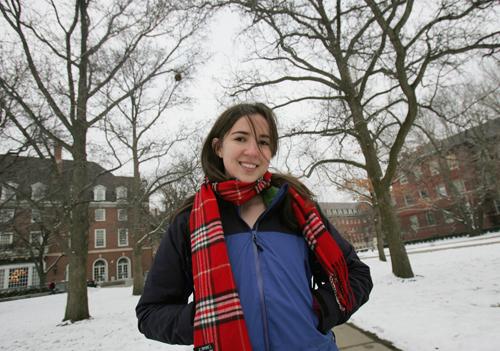UI student recovers from on-campus auto accident

Jan 30, 2007
Although parents can usually cite an age or, if they are lucky, a date, most people cannot recall the day they took their first steps. But Sara Kohnke, freshman in FAA, can.
“It was Dec. 18,” Kohnke said. “A Monday.”
Her response was swift and confident. After three months in a wheelchair, she learned to walk again.
“I wasn’t expecting it,” Kohnke said. “I didn’t expect to be walking until February. It was really surprising.”
Despite overcoming the difficulties of relearning to walk, Kohnke faced additional challenges maneuvering her wheelchair around the University, which is not nearly as handicap-accessible as it should be.
Get The Daily Illini in your inbox!
The day she relearned to walk she was at a doctor’s appointment and X-rays had just been taken. The doctor told her that the bones in her legs had healed enough that she could put weight on them.
“He told me to stand up right there,” Kohnke said. “A physical therapist helped pull me up. They gave me crutches and I walked up and down the hall with him.”
In order to strengthen her leg muscles, Kohnke spent the remaining weeks of winter break lifting weights, walking on a treadmill, and walking and doing exercises in the pool
However, Kohnke is still unable to run and jump, and still has difficulties climbing the stairs.
“Usually by the end of the day it hurts to walk,” she said. “I limp or shuffle around.”
She said she continues to attend weekly therapy sessions at Carle Foundation Hospital, 611 W. Park St. By end of the semester, she said she hopes to regain a full range of motion.
Kohnke also aims to get back on track academically.
“I’m not used to the course load,” she said. “I’m still on a lot of pain medication that makes it hard for me to concentrate.”
Five months ago, Kohnke was rushed to Carle after a driver in a ’94 Chrysler Concorde hit her and two other students as they were crossing the intersection between Springfield and Coler avenues in Urbana. The driver fled the scene but was later ticketed.
The impact of the hit shattered all the bones in her lower legs, broke two vertebrae in her neck and caused a concussion.
After two weeks, Kohnke was released from the hospital. Despite her parents’ offer to take her back home, Kohnke resumed her classes the day after her release.
Her mother took the earliest flight out of Stillwater, Okla., and she stayed with Kohnke for three weeks. Her father drove 10 hours to the University when he found out.
“We wanted her to come home,” Kohnke’s mother, Mary, said. “She could have been paralyzed. We were against her staying alone. But we let her decide what was best for herself.”
She went from taking 17 credit hours to 11 since she could neither play her instrument, the flute, nor get to class within the passing period. She also moved from Lincoln Avenue Residence Halls to Daniels Hall for more handicap accessibility.
“I knew that if I was just sitting at home,” Kohnke said, “I would get nothing accomplished.”
In her three months in a wheelchair, she found that it was difficult to get around campus.
“I saw that the campus was not as handicap-accessible as I thought,” Kohnke said.
At one point, Kohnke got stuck in the doors to the Undergraduate Library and then got wedged between the doors of the elevators there. Because her wheelchair was a temporary wheelchair, it was not compact enough to fit in the elevator compartment.
When her father, Neal, came to visit and watch a football game against Purdue University, he also realized the difficulties that handicapped people face on campus.
“We decided that I help push her to the stadium from Daniels Hall,” he said. “I felt it was quite a long trip.”
Because Kohnke was in a wheelchair, they could not sit in the seats that they had purchased tickets for and had to ask for different seats. When the temperature began to drop, Kohnke and her father decided to leave at halftime and stop at Jimmy John’s on Green Street, but her chair did not allow her to enter the restaurant.
“Sara had to sit out there while I got our sandwiches,” her father said. “I was not happy about her being in the cold.”
In addition to feeling physically limited, Kohnke felt she was treated differently than when she could walk.
“In most classes I went to, people didn’t talk to me. I felt like I was a big burden and that it was a hassle for people to hang out with me, ” Kohnke said.
But despite the difficulties she faced, Kohnke said she feels that her accident gave her a greater appreciation for simple things like the ability to walk.
“I was able to get around but there were places I still couldn’t go,” she said. “Everything was so much harder. … I think the experience opened my eyes to handicap accessibility.”





